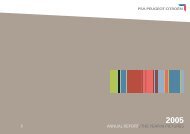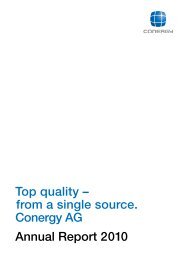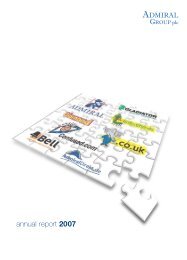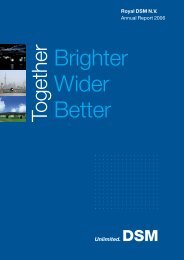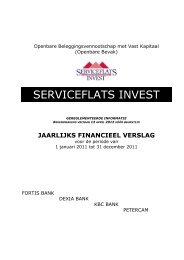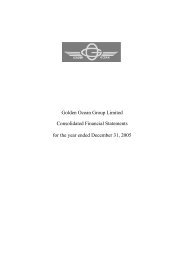BOC Report and accounts 2005 - Alle jaarverslagen
BOC Report and accounts 2005 - Alle jaarverslagen
BOC Report and accounts 2005 - Alle jaarverslagen
Create successful ePaper yourself
Turn your PDF publications into a flip-book with our unique Google optimized e-Paper software.
28 The <strong>BOC</strong> Group plc Annual report <strong>and</strong> <strong>accounts</strong> <strong>2005</strong> Social, environmental <strong>and</strong> ethical performance<br />
Overall safety performance<br />
Lost workday case rate<br />
Total recordable case rate<br />
Passenger car avoidable<br />
accident rate<br />
Truck avoidable accident rate<br />
2004 <strong>2005</strong><br />
0.41 0.37<br />
1.18 1.09<br />
2.12<br />
2.38<br />
1.81<br />
2.20<br />
Safety, health <strong>and</strong> the environment<br />
There are no greater priorities for <strong>BOC</strong> than the health <strong>and</strong> safety of our employees, contractors, suppliers,<br />
customers <strong>and</strong> local communities, <strong>and</strong> the protection of the environment. <strong>BOC</strong> is committed to excellence in<br />
managing these areas through normal business practice assisted by its safety, health, environment <strong>and</strong> quality<br />
(SHEQ) function.<br />
SHEQ policies <strong>and</strong> procedures are the responsibility of the Group chief executive <strong>and</strong> are implemented by<br />
<strong>BOC</strong>’s businesses with the support of the SHEQ function.The SHEQ department works within the businesses to<br />
ensure that the Group has a deliverable policy, is active in its risk management <strong>and</strong> professional in its mitigation.<br />
<strong>BOC</strong> has well-established programmes to drive improvement in SHEQ performance. Employees are required<br />
to comply with all external regulations <strong>and</strong> the Group’s policies <strong>and</strong> Code of Conduct. Suppliers are expected to<br />
meet minimum st<strong>and</strong>ards set by <strong>BOC</strong>’s ethical purchasing policy.<br />
SHEQ management st<strong>and</strong>ards, procedures <strong>and</strong> tools are embedded in Group practice by the organisation’s<br />
integrated management systems <strong>and</strong> st<strong>and</strong>ards (see IMSS section above). IMSS outlines the st<strong>and</strong>ards <strong>and</strong> actions<br />
needed to align with, or conform to, internationally accredited certifications such as ISO 9000 (quality assurance),<br />
ISO 14001 (environment) <strong>and</strong> ISO 18001 (health <strong>and</strong> safety).<br />
<strong>BOC</strong> met its objectives in <strong>2005</strong> when the Group:<br />
• Retained safety, health <strong>and</strong> environment as the top priority at EMB level;<br />
• Retained SHEQ at the forefront of Group <strong>and</strong> business unit employee communications;<br />
• Sustained emphasis on behavioural safety through the Safety in <strong>BOC</strong> programme;<br />
• Improved safety <strong>and</strong> environmental performance against 2004 figures;<br />
• Transitioned to using proactive measures (leading indicators), in addition to the traditionally reported lagging<br />
indicators, to measure SHEQ performance;<br />
• Took positive measures to improve road transport safety;<br />
• Continued to conduct its annual environment survey to highlight opportunities for continuous improvement;<br />
• Set initial environmental targets for 2006 <strong>and</strong> beyond.<br />
Along with the Code of Conduct <strong>and</strong> the Group’s ACTS operating principles, the Safety in <strong>BOC</strong> programme<br />
ensures that SHEQ issues are managed consistently across all countries <strong>and</strong> businesses, in accordance with our<br />
SHEQ policies <strong>and</strong> principles.<br />
Safety<br />
Safety is <strong>BOC</strong>’s highest priority <strong>and</strong> the Group has one simple goal: zero incidents <strong>and</strong> injuries. Safety is the first<br />
agenda item at every EMB <strong>and</strong> business executive meeting. Great emphasis is put on providing all our employees<br />
with the necessary training, equipment <strong>and</strong> safeguards such that no-one gets hurt. Business managers around the<br />
world, with SHEQ support, continually strive to improve safety performance <strong>and</strong>, through our Safety in <strong>BOC</strong><br />
programme, are now focusing on individuals’ behaviour <strong>and</strong> the effect that safe <strong>and</strong> unsafe behaviour has on the<br />
organisation.<br />
Each business unit has a SHEQ function, reporting to the business unit’s executive <strong>and</strong> the Group SHEQ<br />
function through a global peer group.This ensures that global best practice <strong>and</strong> the functional requirements of the<br />
business <strong>and</strong> Group are always at the forefront of management thinking.<br />
<strong>BOC</strong> manufactures <strong>and</strong> distributes products that are potentially hazardous, some being stored at very low<br />
temperature or under pressure, <strong>and</strong> some having toxic or flammable properties. Consequently, the Group is<br />
committed to reducing the risk of harm to people through its products. Operating safely <strong>and</strong> communicating safe<br />
working practices are an integral part of its safety <strong>and</strong> product stewardship processes.<br />
It is important for the Group not only to have clear <strong>and</strong> measurable performance st<strong>and</strong>ards practised by all<br />
<strong>BOC</strong> employees, plants, depots <strong>and</strong> distributors, but also to disseminate these safe working practices to our<br />
customers <strong>and</strong> suppliers. IMSS contains product safety <strong>and</strong> stewardship instructions, policies <strong>and</strong> procedures. Each<br />
product line has specific st<strong>and</strong>ards attached to it. <strong>BOC</strong> undertakes research into the health <strong>and</strong> safety of its<br />
products, keeps abreast of new scientific information <strong>and</strong> works with industry <strong>and</strong> public bodies to reduce risk <strong>and</strong><br />
share learning.This year <strong>BOC</strong> launched an online safety advice service, bocsafety.net, to help customers identify risks<br />
<strong>and</strong> unsafe practices <strong>and</strong> adopt guidance on best practice to comply with the law.<br />
<strong>BOC</strong> continuously strives to improve safety in the workplace <strong>and</strong> combat the root causes of safety incidents.<br />
In <strong>2005</strong> <strong>BOC</strong> Edwards, which manufactures hazardous gases for use in processing semiconductors, was recognised<br />
for its safety performance. In South Africa, <strong>BOC</strong> Edwards received two NOSA safety awards for occupational risk<br />
management procedures at the nitrogen trifluoride plant in Pelindaba. In the US, <strong>BOC</strong> Edwards’ special gases plant<br />
at Medford, Oregon, was awarded the OSHA Voluntary Protection Programs’‘Star Program’ status for selfsufficiency<br />
in their ability to control workplace hazards. EMC, <strong>BOC</strong>’s US-based water management business, won<br />
several Water Environment Association awards. EMC’s water treatment plant at Ligonier, Indiana, won the<br />
prestigious Water Environment Federation’s Burke Award.<br />
Regrettably, three Group employees died in work related activities in <strong>2005</strong>.Two employees tragically died in<br />
road incidents, one in the UK <strong>and</strong> one in the US, both of which involved third parties.These incidents reinforce our<br />
commitment to remain focused on transport safety during 2006.Another employee was killed in Taiwan, by falling<br />
from a height at a customer location. In addition, <strong>BOC</strong> experienced six contractor fatalities during the period.<br />
The Group chief executive, SHEQ director <strong>and</strong> business unit managers review every fatality <strong>and</strong> major<br />
incident personally. Investigations are only closed when the chief executive is fully satisfied that the root causes of<br />
the incident are understood <strong>and</strong> action has been taken to prevent future recurrences.



